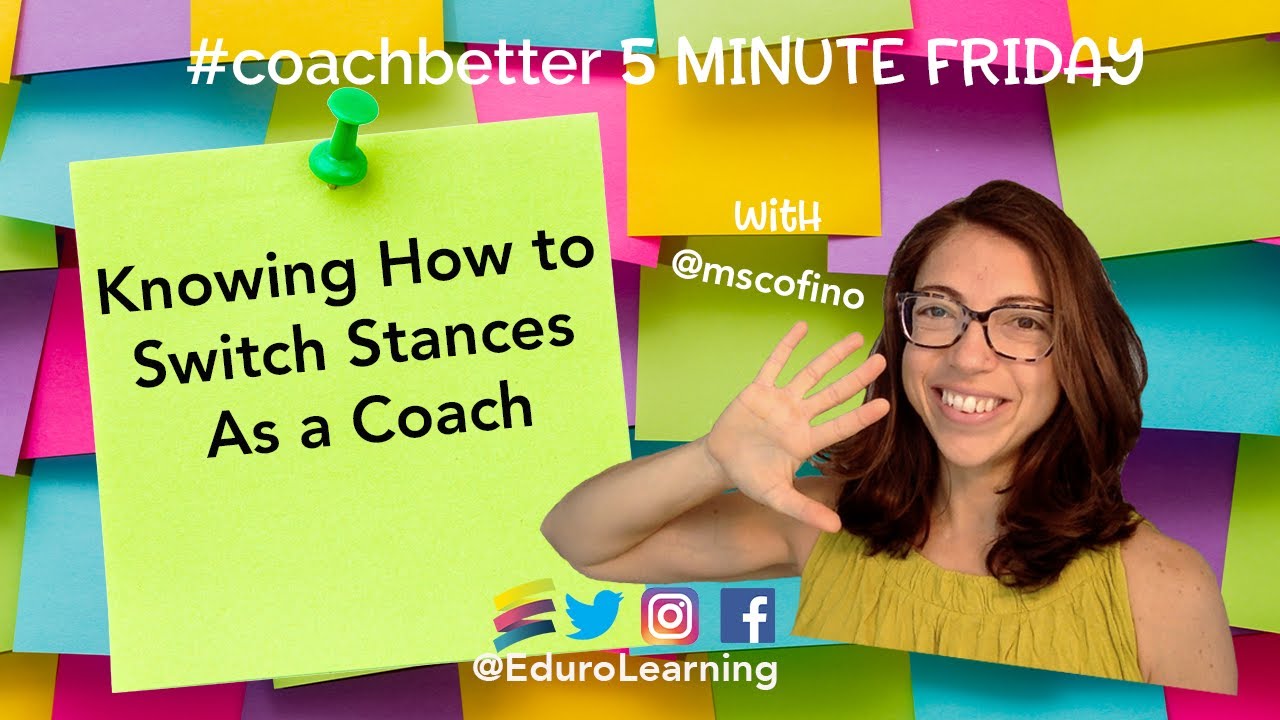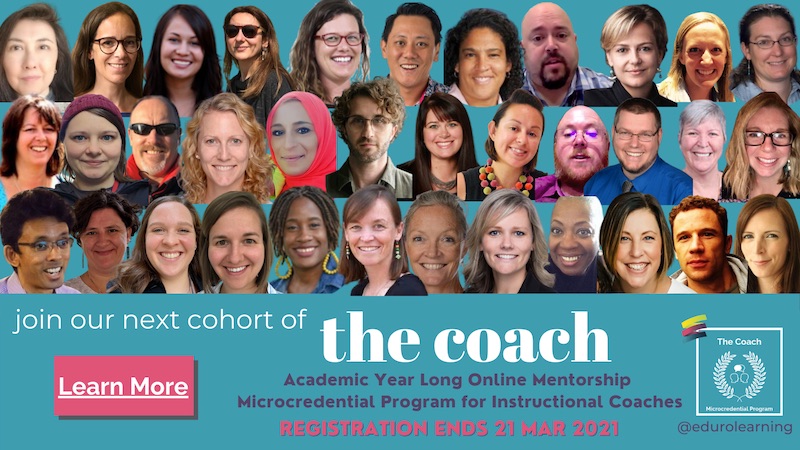Knowing how to switch stances or roles as an instructional coach is a big challenge that lots of coaches face. We know that in our roles, we need to switch between different approaches when we’re working with teachers, even sometimes right there in the very moment when we’re having that conversation. It can be really challenging to figure out how to make that transition.
In a previous 5 Min Fri video, The 3 Key Roles of an Instructional Coach (soon to be a post here), I talked about the different stances that coaches may take the consultant, the collaborator, or the coach. As we know, coaching is a fine balance. We need to support teachers in the stance that they need in that moment, but knowing how to tell which stance they need and then how to switch. For example if we started in one stance and we need to transition to another, what is the phrasing that we might use in that moment?
Here are four important elements to knowing how to switch stances as an instructional coach.
1:: Ask
The first thing you can do is just ask directly: you can say, “how can I best support you today?”
Then be transparent about the ways that you can help. It’s often worth just asking yourself:
- What does the teacher need right now?
- Are they in the middle of a stressful moment and they just need answers to their question?
- Are they wanting to probe deeper into their professional learning and have a thoughtful conversation about their professional growth at this moment, right now?
To help determine this, you can say:
- What do you need today?
- What’s on your mind?
- What are some burning issues?
Then you can kind of tease out how they feel and what they’re looking for in this conversation by listening to their responses.
2:: Listen for Cues
As the teacher is talking, you might hear emotion in their voice. They might be excited about something, and you can tell that they’re ready to dig deeper into it and they have lots of ideas. Or you might hear stress and frustration, and you can see that they might be at the end of their rope, and they really just need a consultant to help them answer those questions.
You can also listen for the types of stories they’re telling and the types of stories that resonate with them. This was a great moment in our conversation with Steve Barkley, on the #coachbetter podcast, where he talked about how identifying the kinds of stories that teachers resonate with, or respond to, is one of the ways that he can tell how to make the next move in his coaching conversation
Another thing to listen for in the clues is how they ask the question. What kind of language are they using in the question they’re asking, do they seem like they are really at the end of their rope and they’re just super frustrated. They can’t handle it anymore, or are they kind of pondering, Oh, I might do this. Or I might do that. And you can tell they’ve got ideas to pull from already. So those clues are really important to help you see exactly where the teacher is at. In this moment in time.
3:: Consider Timing
The third piece to consider is to be aware of time or stress that this teacher might be facing to think about. Consider:
- When are you having this conversation: is it reporting season, or end of the year, or parent teacher conferences? Or did you happen to see them in the hallway and you’re having a quick conversation, or are you sitting down at lunch and actually taking some time to have a deeper conversation?
- You might want to think about what’s next for this teacher: where are they going after this meeting? What is their day or their week or this month like? Is it a really stressful time for them? Are they running to another class?
- In the big picture, what is the timeline for the support they need? Is this a project they started six weeks ago and it’s due for the students tomorrow and they just need to tweak a tiny little bit of thing? Or is it something that’s going to happen a couple of weeks from now and they have time to work more deeply with you to build something more substantial in terms of your coaching relationship?
All of these are clues to help you figure out if they just need a five minute support conversation or if they have a little bit more time to have a coaching conversation.
4:: Offer to Make a Transition
You can always offer the opportunity to choose the direction of the conversation to the teacher, mid conversation. If you sense that they came into this meeting wanting a coaching conversation, but you can sense they’re really just looking for an answer right now, you might just say, “I have an idea. Would you like me to share?” Or if they want to be a collaborator, you might say, “let’s work through this together.” Those kinds of transition phrases can help both you and the teacher recognize that you’re moving through different roles as a coach. We talked about this in our #coachbetter episode with James Dialzel too!
Those are four ways that you, as a coach can know how to switch stances during an instructional coaching conversation.
Watch the 5 Min Fri Episode!
Level Up Your Coaching with The Coach Microcredential
Being able to seamlessly transition between the many roles of a coach is no easy task! If this is something you’re interested in working on this academic year, please join us for our next cohort of The Coach Microcredential.
If you’re interested in The Coach, Tianna Loeffler, ES Classroom Teacher & Technology Coach in Colorado, USA shares why she would recommend you take The Coach:
The Coach is a great opportunity for really personalized professional development and has taken me a long way in my journey on learning how to be a coach and coaching better. I get an opportunity to have a video chat with my mentor every other week. That’s Kim and she’s been fantastic, always giving me ideas and the coaching that I need using the skills of a coach to help coach me. So I’m also learning those skills as well, and also answering any questions and helping me along the way when I’m trying to fumble through my way of, of coaching. So I highly recommend recommended. I would definitely suggest you try and join to really help you develop your professional coaching skills.
Tianna Loeffler, ES Classroom Teacher & Technology Coach
If you are thinking now is the time to invest in a coach for you, please join us for The Coach Microcredential! Registration opens only once a year, and we would love to have you in our next cohort. Of course, these kind of mentoring conversations are included in The Coach, that personal connection and guidance is built into the Academy and Premium cohorts.
After a very unusual year, now is the time to invest in yourself, to build up your professional learning network of educators around the world and connect with a community that inspires you! Plus, you’ll have a mentor who is an outside sounding board who will help you get outside of the group think or tunnel vision you might be stuck in, in your school context.
Since the program is sustained over an entire academic year, you are growing with your coach over that time, helping deepen your learning throughout the course of the program. The regular meetings with your mentor will help you reflect on the coaching challenges and opportunities that you find yourself presented with.
Of course The Coach is totally customized learning. We have standard content that we share with everyone, but then each time you meet with your mentor, every conversation is tailored exactly to your needs, including regular check-ins that will help provide you with customized resources that you need to help you keep growing in your role.
If you are ready to make a bigger impact in your school context, The Coach is for you! Learn more here!


Recent Comments